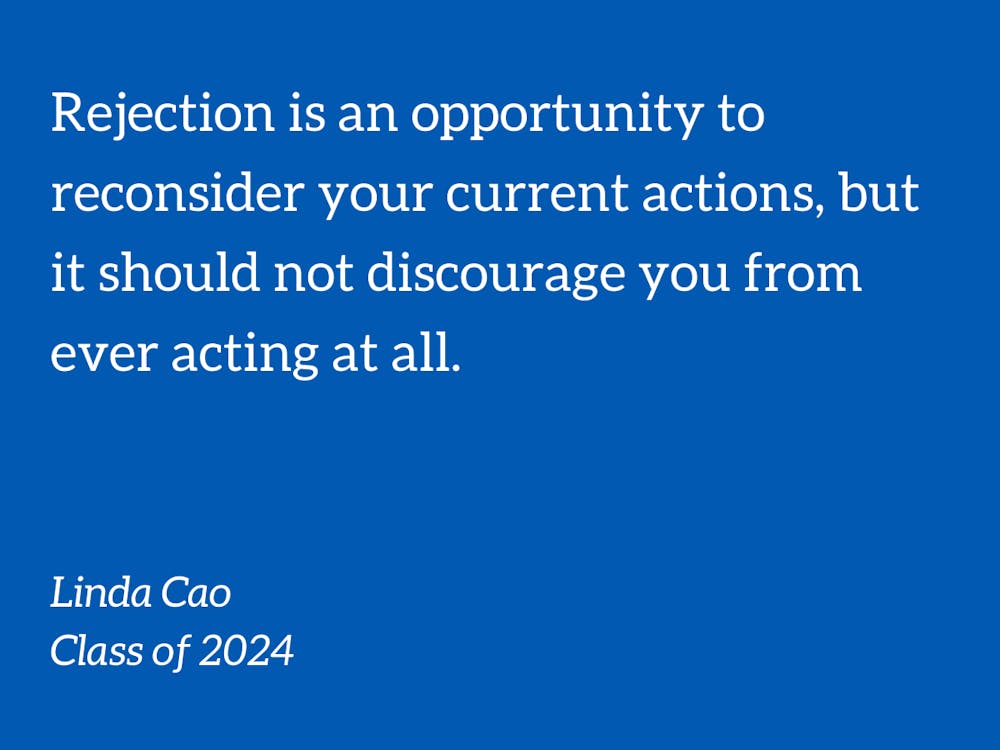“Let’s just be friends.” Four words that can succinctly break your heart.
“Thank you for your interest.” Five words that can make your stomach drop.
Sometimes, just a glance away is enough for someone to burn with tears. Rejection, whether it is enunciated or implied, can hurt excruciatingly, inciting a sense of panic as if you’re about to die.
Well, technically, you’re not wrong.
When we consider rejection, we focus specifically on emotional pain. Given that there are no physical consequences of rejection, we’re usually told to just “get over it.” However, surprisingly, a research study conducted by the University of California and Purdue University concluded that the feelings of rejection results in increased activity in the two regions of the brain that are commonly alerted in response to physical pain. Therefore, from our brain’s perspective, a broken heart is equivalent to a broken arm.
Although it is important to acknowledge that this connection exists, I believe that it would be more detrimental if we address rejection as physical pain. Emotional and physical pain are linked but should remain their own entities because, despite what our brains think, a broken heart is not the same as a broken arm. Both require different paths of treatment.
Fundamentally, rejection is exclusion. For example, you’re not invited to a Sunday brunch, or you weren’t accepted into a prestigious program. Essentially, you are being told from a seemingly superior second party that “you do not belong here.” Exclusion is what triggers that inconsolable feeling that you’re going to die.
No, you’re not being dramatic. No, you’re not being extra. You are simply reacting how evolution has instructed you to act. What seems like an overreaction is, in fact, a complete normal reaction. Humans haven’t always been the technological and psychological advanced beings we are today, some more than others. According to Mark R. Leary, PhD, a professor of psychology and neuroscience at Duke University, our prehistoric ancestors lived in small nomadic bands on the deserted wild lands of Africa, where being rejected from the social group would have been a guaranteed death sentence.
In other words, rejection meant that you were literally going to die.
Therefore, rejection sets off multiple of our psychological and biological alarms, emphasizing the need to reconsider our social circumstances. TL; DR: we have a mental breakdown. So, it is normal to feel like you’re going to die after being rejected. Essentially, our brain system has some backlogged files that desperately need to be updated, because obviously we are not going to die if we are rejected from a social group. It’s just that our brains have evolved to believe that.
Yet, I agree that it is difficult to actively disagree with what your brain is telling you to do. With social media and modern technology, there are abundant opportunities for rejection. For example, you see an Instagram post for a party that you were not invited to. Boom. Rejected.
Hence, another impactful factor of rejection is that it always feels personal, even when it is not. Why did they reject me specifically? What is wrong with me? Thus, in addition to accepting that your emotions are justified, the best initial reaction you can have for rejection is to dissociate yourself from the party that is rejecting you. There are a million things that go behind any decision, whether it’s a movie invitation or a college acceptance. Of all the million things, I’d argue that you probably have control over 50 – 75% of them depending on the situation. In other words, there are always uncontrollable factors that may work against or with you. Maybe your job interviewer was stuck in traffic for 3 hours and had a lousy morning before meeting with you. Maybe the position wanted someone with different credentials. Maybe it just wasn’t a good fit. A lot of the times rejection is not personal.
Ultimately, rejection eats us alive because we, humans, tend to always assume the worst. As a pessimist myself, I admit that a lot of my pain from rejection could have been resolved if I was more resilient to spiraling into negativity. Am I not smart enough, passionate enough, witty enough, pretty enough, good enough? Am I just not enough? Sometimes feeling like you’re about to die is the better alternative than just feeling inadequate.
Emotions, unfortunately, are hard to control. I won’t stop spiraling immediately simply because I recognize that it is doing more harm than good. The mind doesn’t work like that. However, resilience towards rejection can be developed over time. Rather than waiting to be invited, maybe invite your friends to Sunday brunch. Maybe apply for the job again next year, with the proper credentials that the company is seeking for. Whatever you do, do not withdraw. Do not let the rejection sucker punch you in a corner, leaving you doubting your self worth and value. Rejection is an opportunity to reconsider your current actions, but it should not discourage you from ever acting at all. It’s okay to be rejected, even if you feel like you’re going to die, because all you need is the courage to wipe your tears, tend to your injuries, and start again.
Linda Cao is a Trinity sophomore. Her column runs on alternate Thursdays.
Get The Chronicle straight to your inbox
Signup for our weekly newsletter. Cancel at any time.
Linda Cao is a Trinity senior and an opinion managing editor of The Chronicle's 119th volume.

